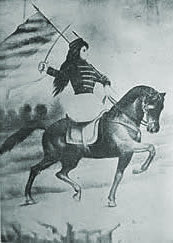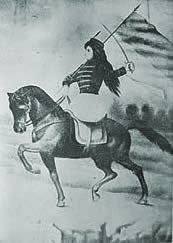
|
Women and Independence in Latin America An exploration of women's involvement in the Latin American Wars of Independence |

|

|
Women and Independence in Latin America An exploration of women's involvement in the Latin American Wars of Independence |

|
Gender:Male
Ethnic origen: White
Events:
| 1801 | - | Ireland | - | Not applicable | - | He was born in Cork, Ireland. |
| 1817-1831 | - | Venezuela | - | Patriot | - | He fought in the independence wars. |
| 1817-1831? | - | Peru | - | Patriot | - | He fought in the independence wars. |
| 1817 | - | Venezuela | - | Patriot | - | He sailed to Venezuela to join the independence movement. |
| 1819 | - | Tunja | - | Patriot | - | He fought in the Battle of Boyacá , 7 August 1819. |
| 1819 | - | Paipa | - | Patriot | - | He fought in the Battle del Pantano de Vargas |
| 1822 | - | Pichincha | - | Unknown | - | He fought in the battle of Pichincha, 24 May 1822. |
| 1828 | - | Bogotá | - | Unknown | - | He married Soledad Soublette, the sister of General Soublette (later President of Venezuela). |
| 1840 | - | Caracas | - | Unknown | - | His memoirs were completed (but not published) around this date. |
| 1854 | - | Bogotá | - | Unknown | - | He died of apoplexy caused by a brain haemorrhage early on the morning of 24 February 1854 |
Connections:
Bolívar friendsTexts:
1790 - The ´Detached Recollections' of General D.F. O'Leary
Biography:
Born in Ireland in 1801; in 1817 he enlisted in a South American patriotic army raised in Britain by Venezuelan agent Luis López Méndez. He sailed from Britain on 3 December 1817, reaching Angostura at the end of March 1818. He joined General Jose Antonio Páez in May 1817 and met and became good friends with Simón Bolívar. He fought in several battles including Boyacá (7 August 1819) Carabobo (24 June 1821) and Pichincha (24 May 1822). He was promoted to lieutenant colonel in 1822. In 1820 he became Bolívar's aide-de-camp and was present at the meeting between Bolívar and San Martín in Guayaquil. He went with Bolívar to Lima in August 1823. He was then sent to Chile. In 1825 he accompanied Bolívar to Potosí. In May 1826, as Bolívar's position was weakening, O'Leary was sent on conciliation missions to Bogotá and Caracas in attempts to stop secession. In 1828 he was sent on another failed mission to bring peace between Colombia and Peru. In September 1829 he was sent to Antioquía to suppress a revolt by General José María Córdova. After Bolívar's exile and death he went to Jamaica, returning to Caracas in 1833. He became British consul for Caracas in 1841. In 1828 he married the sister of General Soublette, later President of Venezuela. They had 9 children. The eldest, Simón Bolívar O’Leary edited and part-translated his father’s memoirs. These memoirs (32 vols.) were completed in around 1840 and published in Caracas 1879-88. 29 of these volumes are letters to and from Bolívar and other documents relating to Bolívar and the Independence wars. (Bolívar’s archive). The other 3 volumes are O’Leary’s memoirs. They were written in the hope of "confounding Bolívar's detractors both in Europe and America", although he also claimed "conozco los defectos del carácter del General Bolívar, y no pienso ocultarlos". He died in 1854. (Humphreys, 3-8)
Lynch describes his Memorias as the "richest contemporary narrative of the northern revolution". (Lynch, xx)
References:
Humphreys, R. A. (editor). (1969) The ´Detached Recollections' of General D. F. O'Leary
Lynch, John (1986) The Spanish American Revolutions 1808-1826
Romero de Valle, Emilia (1966) Diccionario manual de literatura peruana y materias afines